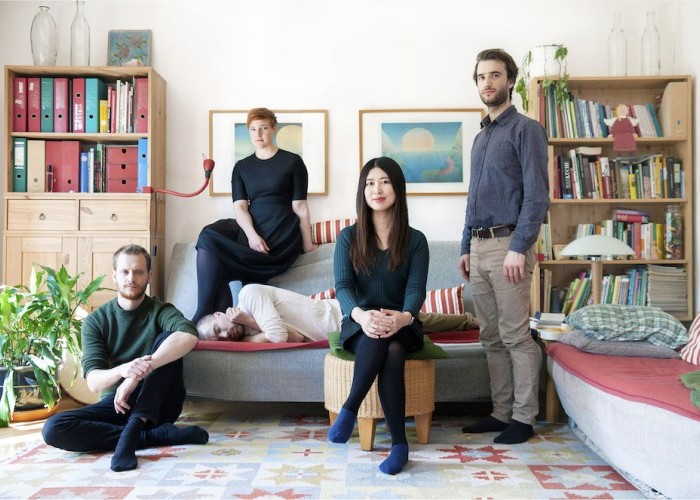Jan 13, 2026 2:09 PM
More Trump-Kennedy Center Cancellations
The fallout from the renaming of the John F. Kennedy Center for the Performing Arts to include President Donald…

A very relaxed Christian Meaas Svendsen with members of Nakama
(Photo: Lisi Charwat)In his recent improvisational practice, Norwegian bassist Christian Meaas Svendsen embraces a deeply physical relationship to his instrument, doing his best to erase the line between his body and his bass. He frequently uses multiple bows simultaneously—one in his hand, another in his mouth—while vocalizing with the sounds he produces on the instrument. He plays in bare feet, and sometimes he’ll use a foot to damp the strings. His solo performances present him alternately dancing and wrestling with his bass.
“Those things are very easily regarded as gimmicky,” he said, “but I didn’t start doing it to create a gimmick. It came naturally, and I was thrilled to explore an approach to the instrument which revolved more around my physical relation to the instrument and to step away from cemented positions.”
During the past decade Svendsen, 30, has become an increasingly vital figure in Norwegian improvised music, playing in Paal Nilssen-Love’s Large Unit, fellow bassist Jon Rune Strøm’s Quintet and in the trio Momentum, among others. But his personality comes through most clearly in his own projects, frequently released through his Nakama label, which shares the name of a collective quintet he’s worked with since 2015.
“I wanted to make music that embraced our differences and still make it work somehow,” Svendsen said about the group, which includes a violinist and vocalist.
With the ensemble’s latest effort, Worst Generation, they’ve succeeded, forging a thrumming landscape of ebb-and-flow activity that affords singer Agnes Hvizdalek enough space to draw from her arsenal of wordless vocalizing.
Svendsen, who came late to music—picking up an electric bass when he was 15 to play in rock bands with his friends—stresses that he’s not a natural musician.
“I wanted to know how music was constructed and to understand why that note fit with that chord, and why that chord should come after that chord,” Svendsen said.
He grew up in Kongsberg, a modest silver mining town a couple hours outside of Oslo that happens to host an excellent annual jazz festival. He eventually studied at the Norwegian Academy of Music, where Svendsen admits he felt his abilities were dwarfed by those of his classmates. But the pressure propelled him, only encouraging his curiosity and drive to learn. After earning a degree in jazz during 2012, he went on to study classical music at the same school.
His broad-minded aesthetic can be gleaned from the impressive 2017 recording Avin, a song collection featuring an eight-piece band that drifts toward art song, with Svendsen’s wobbly singing injecting a homemade charm to the exquisite arrangements.
“I’m interested in connecting different established genres, but I’m also interested in getting rid of them altogether,” he said, citing American maverick composer Harry Partch as an example of an artist “who carved his own way.”
Indeed, the next Nakama album reflects such unfettered exploration—a collaborative effort with a Zen chanting choir. But Svendsen’s still committed to free jazz, with a new album set for release by a Scandinavian quartet, which includes Swedish saxophonist Anna Höberg, called the Big YES!
And he’s pressing forward with new elements to his solo practice as well.
“I’ve teamed up with Kyrre Laastad, who will put microphones on certain spots on my body—over the heart, vocal cords, under my nose—places that make sound,” Svendsen said. “He will subtly amplify some of those spots to bring my bodywork closer to the audience.” DB

Belá Fleck during an interview with Fredrika Whitfield on CNN.
Jan 13, 2026 2:09 PM
The fallout from the renaming of the John F. Kennedy Center for the Performing Arts to include President Donald…

Peplowski first came to prominence in legacy swing bands, including the final iteration of the Benny Goodman Orchestra, before beginning a solo career in the late 1980s.
Feb 3, 2026 12:10 AM
Ken Peplowski, a clarinetist and tenor saxophonist who straddled the worlds of traditional and modern jazz, died Feb. 2…

The success of Oregon’s first album, 1971’s Music Of Another Present Era, allowed Towner to establish a solo career.
Jan 19, 2026 5:02 PM
Ralph Towner, a guitarist and composer who blended multiple genres, including jazz — and throughout them all remained…

Rico’s Anti-Microbial Instrument Swab
Jan 19, 2026 2:48 PM
With this year’s NAMM Show right around the corner, we can look forward to plenty of new and innovative instruments…

Richie Beirach was particularly renowned for his approach to chromatic harmony, which he used to improvise reharmonizations of originals and standards.
Jan 27, 2026 11:19 AM
Richie Beirach, a pianist and composer who channeled a knowledge of modern classical music into his jazz practice,…